- Home
- Don DeLillo
The Names Page 31
The Names Read online
Page 31
He could barely see by the time he approached the bins. The sand stung his face and he walked with his arm crooked in front of him, opening his eyes only long enough to glimpse the way. Something startled him, a man standing at the head of the path, dark-skinned, his hair ringleted and wild, his face uncovered despite the blowing sand. Shadows around the flat eyes, a danger in his bearing. But he was also oddly calm, waiting, wrapped in garments from neck to ankles, hands hidden, head and feet bare, and he was saying something to Owen. Was it a question? They looked right at each other. When the man repeated the words, Owen realized the language was Sanskrit and he knew at once what the man had said, although he made no conscious attempt to translate.
The man had said, “How many languages do you speak?”
Half the room was filled with light. He sat up, a little unsteady in his movements. I don’t think I’d fully realized how exhausted and ill he was. The only strength was in his voice.
“That’s a question I always dread being asked,” I said. “It’s a question that seems to be waiting for me wherever I go in the Mideast. I don’t know why it carries such force.”
“It’s a terrible question in a way, isn’t it?”
“But why?”
“I don’t know,” he said.
“Why do I think it exposes some terrible weakness or failing?”
“I don’t know.”
“You can answer it. Five, six.”
“Counting Sanskrit. Which comes pretty close to outright cheating. In my own defense I’d have to say there was never anyone I could speak it with, except that boy on the embankment. They’re teaching it again in the schools.”
“Did you speak it with them?”
“On and off.”
“How did you know they were there? From the group in the Mani?”
“They said there was a cell in India. They’d gone there from somewhere in Iran. I was to look for a place called Hawa Mandir.”
“You took your time looking.”
“It was my view, my sentiment that India would cure me of the fascination. Is there more water?”
“The jug is empty.”
“Y0u have to fill it in the street. There’s a tap two houses down.”
When I returned he was asleep, sitting up, his arm dangling over the side of the bench. I woke him without hesitation.
The man’s name was Avtar Singh. Owen suspected this was a pseudonym and was never able to convince himself that Singh was an Indian. The man was not only an impressive mimic but seemed to look different every time Owen saw him. An ascetic, streetcorner preacher, a subway bedlamite. His physiognomy changed, his features as aspect and character. Intelligent, vain, obsequious, cruel. He’d look lean and severe one day, a mystic in shabby robes; puffy the next, physically bloated, eyes heavy and drugged.
The Greek cell had broken up and two of the members were here, recent arrivals. Emmerich was one, a man with an austere head and tight beard. The other was the woman, Bern, thick lipped, broad, utterly silent for weeks now. She spent almost all her time sealed in one of the thatched silos.
There were two other men but Owen had little contact with them. All he knew was that they’d been with Singh in Iran, that one of them was suffering frequent cycles of chills and high fever and that they were evidently Europeans. They did not speak Sanskrit as the others did, or tried to do, and it was this as much as the group’s predominant mood which indicated to Owen that the cult was nearly dead.
One day he squatted in the dust with Emmerich. They talked about Sanskrit, speaking the language itself as well as several others. Emmerich had the look of an intelligent convict, someone in for life, for murder, self-taught, self-willed, an expert on the tradecraft of a confined life, contemptuous of people who want to know what it is like—contemptuous even as he agrees to enlighten them. He is well settled in his life term, this kind of man. His crime, the largeness of it, furnishes endless material for speculation and self-knowledge. Everything he reads and learns is made to serve as a personal philosophy, an explanation, an enlargement of that brilliant single moment, a moment he has reworked, re-explained to himself, made use of. The murder has by this time become part of the dream pool of his self-analysis. The victim and the act are theory now. They form the philosophical base he relies on for his sense of self. They are what he uses to live.
“The Sanskrit word for knot,” Emmerich said, “eventually took on the meaning of ‘book.’ Grantha. This is because of the manuscripts. The birch-bark and palm-leaf manuscripts were bound by a cord drawn through two holes and knotted.”
An austere head, Owen kept saying to himself. His father used to laugh at the oversized straw hat he wore with his bib overalls. Passing the crossroads store. The canopy and Coca-Cola sign. The wood posts sunk in cinder block. His mother used to say, “l don’t know more’n a monkey what you’re talking about.”
Emmerich’s head was smallish, with eyes that maintained a grim distance, closely cut hair and beard. The two men squatted at angles to each other, as though delivering their remarks out into the desert.
“What is a book?” Emmerich said. “It’s a box that you open.
You know this, l think.”
“What is inside the box?”
“The Greek word puxos. Box-tree. This suggests wood, of course, and it’s interesting that the word ‘book’ in English can be traced to the Middle Dutch boek, or beech, and to the Germanic boko, a beech staff on which runes were carved. What do we have? Book, box, alphabetic symbols incised in wood. The wooden ax shaft or knife handle on which was carved the owner’s name in runic letters.”
“Is this history?” Owen said.
“This is not history. This is precisely the opposite of history. An alphabet of utter stillness. We track static letters when we read. This is a logical paradox.”
Bern appeared, walking once around the bin, re-entering. The bin, silo or granary. Owen would have to learn the local name. This he made his first task in new places, always.
“She will try to kill herself,” Emmerich said. “She will starve herself. Already she’s starting. Three, four days. It came to her like a sacred revelation. This is the perfect way. Starvation. Drawn-out, silent, losing the functions one by one. What is better in a place like India than starvation?”
“Is this the end of it? Is there another group somewhere?”
“To my knowledge this is the end of it. There are no more cells outside of this one. Maybe two or three individuals left, possibly in contact with each other, possibly not.”
“Will you all die here?”
“I don’t think Singh will die. He will outfox it, out-talk it. Bern will die. The other two will probably die. I don’t think I will die. I’ve learned too much about myself.”
“Isn’t this why people kill themselves?” Owen said.
“Because they’ve discovered who they are? I admit I’ve never thought of that. And you. Who are you?”
“No one.”
“What do you mean ‘no one’?”
“No one.”
They squatted like Indians, close to the ground, arms draped over their knees.
“For a long time nothing happens,” Emmerich said. “We begin to think we barely exist. People wander off, people die. Many differences appear among us. We lose purpose, suffer setbacks. There are differences in meaning, differences in words.”
“She won’t eat. Will she take water?”
“So far she has taken it. This is to draw it out, to extend the silence. You know this. She is very doctrinaire. For such people, dying is a methodology.”
“ln Greece she was reluctant to talk to me.”
“You aren’t a member. It was only your training as an epigraphist that made you more or less welcome, your digs and travels. We saw you could be trusted. This was a quiet and scholarly and deeply intense interest. But not Bern. She didn’t care. Things began to irk her in Greece. Someone stole her boots.”
“What happened to the others wh
o were with you?”
“Scattered.”
These bins were made of dung and earth. There were figures in the distant fields, stooped, moving. A dusty snake curved through the weeds. The one color. Formed and ordered. The high white sun.
“But there is still the program,” Emmerich said. “Singh has found a man. We are waiting for him to approach Hawa Mandir. Let’s face it, the most interesting thing we do is kill. Only a death can complete the program. You know this. It goes deep, this recognition. Beyond words.”
These were not kites but sparrow hawks, he decided. No chaos, no waste.
“Sometimes I ask myself,” Emmerich said. “What is the function of a murderer? Is he the person you go to in order to confess?”
“He was wrong,” I said, surprised at my own abruptness. “You weren’t there to confess anything.”
“Unless it was to acknowledge my likeness to them.”
“Everybody is like everybody else.”
“You can’t mean that.”
“Not exactly. Not stated exactly so.”
“We overlap. Is that what you mean?”
“I’m not sure what I mean.”
His voice grew soft. He was careful not to accuse, not to hurt.
“What do you see when you look at me?” he said. “You see yourself in twenty years’ time. A damn sobering sight. It’s true, isn’t it? Our likeness is a kind of leap, a condition you can’t help but foresee. You used to oppose almost everything I said. Less so of late. As though you’ve begun to hedge your bets. You see yourself, James, don’t you?”
Alone, weak-willed, defenseless, taking the stairs two at a time. Was this true, was he right? I would never completely understand Owen, know his reasons, know the inner shapes and themes. This only made the likeness more plausible.
Feet flat on the ground, weight on the calves, arms draped over the knees. They hunkered in one of the bins. Singh rubbed two long stones against each other, rough-shaping them as he talked. He was a talking machine. He moved from Hindi to English to Sanskrit in the space of a single long remark. Owen was afraid of him. He was too clearly on the maniacal edge. He looked mad, spoke in a jumble of tongues, fell into cruel and sweeping laughter, eyes shut, mouth wide open, full of rotting teeth. Owen listened to him talk for much of a long afternoon and through the pale desert vespers and into the night. He was mercurial and deft, sometimes intimidating, sometimes appearing to seek favor. Not a true games-player, not an observer of the rules, Owen thought, astonished at the stupidity of this reflection. Singh was electric, messianic, crazy, the coarsely grained face set in a mass of dusty ringlets. He stopped rubbing the stones only long enough to raise his fingers in the air, indicating quotation marks around a word he used ironically or with a double meaning.
“Thar. This is a contraction of marust’hali. Abode of death. Let me tell you what I like about the desert. The desert is a solution. Simple, inevitable. It’s like a mathematical solution applied to the affairs of the planet. Oceans are the subconscious of the world. Deserts are the waking awareness, the simple and clear solution. My mind works better in the desert. My mind is a razed tablet out here. Everything counts in the desert. The simplest word has enormous power. This is fitting because it’s part of the Indian tradition. The word in India has enormous power. Not what people mean but what they say. Intended meaning is beside the point. The word itself is all that matters. The Hindu woman tries to avoid speaking her husband’s name. Every utterance of his name brings him closer to death. You know this. I’m not telling you something you don’t know, or am I? Indian literature has been eaten by white ants. The bark and leaf manuscripts, nibbled, gnawed, consumed. You know this. India doesn’t need a literature anyway. Superfluous. India is the right brain of the world. Dancing Shiva, you know? Pure motion baby. What I’d like to do when we leave this place is go to northern Iraq and study Yezidi cryptic. You have to see this alphabet to believe it. A little Hebrew-looking, a little Persian, a little Arabic, a little Martian. This thing is cryptic because the Yezidis live among Muslims and can’t stand the mothers. Total mutual loathing, right? If a Yezidi hears a Muslim in prayer he either kills the poor bugger or kills himself. That’s according to the book anyway. There are other alphabets to study in that area. I could go to the marshes. I’d take the woman except she’s serious about starving herself. I’d like to fuck her everywhichway to Sunday or whatever the phrase. She’s the kind you fuck with a vengeance, am I right? Each sound has one sign only. This is the genius of the alphabet. Simple, inevitable. No wonder it happened in the desert.”
“I don’t mean to interrupt.”
“I’m in no hurry,” Owen said. “I’d just as soon put off the rest of it indefinitely.”
“I want to hear it.”
“I don’t want to tell it. It becomes harder and harder. The closer we come to the end, the more I want to stop. I don`t know if I can face all that again.”
“I interrupted to ask about Singh’s idea of the desert. Is there something clear and simple there?”
Owen looked into the shadowed part of the room.
“Singh remarked to me once, his conspiratorial aspect, fixing those flat heavy eyes on me, ‘Hell is the place we don’t know we’re in.’ I wasn’t sure how to take the remark. Was he saying that he and I were in hell or that everyone else was? Everyone in rooms, houses, chairs with armrests. Is hell a lack of awareness? Once you know you’re there, is this your escape? Or is hell the one place in the world we don’t see for what it is, the one place we can never know? Is that what he meant? Is hell what we say to each other or what we can’t say, what is beyond our reach? The sentence defeated me. I was afraid of the desert but drawn to it, drawn to the contradiction. Men will come to fill this empty place. This place is empty in order that men may rush in to fill it.”
The clear voice became a chant now, almost startling in its richness and stately pace. I want to call it a funeral pace.
“To penetrate the desert truly. To learn the geography and language, wear the aba and keffiyeh, go brown in the desert sun. To infiltrate Mecca. Imagine it, to enter the city with one and a half million pilgrims, cross the border within the border, make the hadj. What enormous fears would a man like me have to overcome, what lifelong inclinations toward solitude, toward the sanctity of a personal space in which to live and be. But think of it. To dress as a hadji in two pieces of seamless white cloth, every man there in two pieces of seamless white cloth, over a million of us. To make the seven circuits of the Ka’bah. The great cubical form draped in black, imagine it, with Koranic verses embroidered in gold script. For the first three circuits we are enjoined, to move at a jogging pace. There are other times when great masses gather during the hadj, on the plain of Arafat and for three days at Mina, but it’s the circuit of the Ka’bah that has haunted me ever since I first learned of it. The three running circuits, perhaps a hundred thousand people, a swirl of white-clad people running around the massive black cube, a whirlwind of human awe and submission. To be carried along, no gaps in the ranks, to move at a pace determined by the crowd itself, breathless, in and of them. This is what draws me to such things. Surrender. To burn away one’s self in the sandstone hills. To become part of the chanting wave of men, the white cities, the tents that cover the plain, the vortex in the courtyard of the Grand Mosque.”
“I thought it was one big bus jam, the hadj.”
“But do you see what draws me to the running?”
“To honor God, yes, I would run.”
“There is no God,” he whispered.
“Then you can’t run, you mustn’t run. There’s no point, is there? It’s stupid and destructive. If you don’t do it to honor God or imitate the Prophet, then it means nothing, it accomplishes nothing.”
He withdrew into a silence, a deprived silence. He’d wanted to explore the matter further, the fearsome driving rapture of it, but my rejection was the type he could not contend with. He was like a child in this respect, that silence was
a place to take his hurt and shame.
“What else did Singh have to tell you?”
“He talked about the world.”
“Then what happened?” I said.
He talked about the world.
“The world has become self-referring. You know this. This thing has seeped into the texture of the world. The world for thousands of years was our escape, was our refuge. Men hid from themselves in the world. We hid from God or death. The world was where we lived, the self was where we went mad and died. But now the world has made a self of its own. Why, how, never mind. What happens to us now that the world has a self? How do we say the simplest thing without falling into a trap? Where do we go, how do we live, who do we believe? This is my vision, a self-referring world, a world in which there is no escape.”
His flesh was pebbled along the forehead and cheeks. He had long wrists and hands. Slowly the two stones began to take on a faintly tapered shape. He rubbed the stones for hours, then days. Bern was hallucinating. They heard her moan and chant. She crawled outside to urinate, positioned on all fours. Three of the men went looking for a stray goat to kill. Owen went to Bern’s silo, not knowing why. The seal was in place, an earthen hatch-cover about three feet off the ground, held fast by a wooden bar inserted through a pair of sockets. He removed the cover and bent down to look into the silo. She sat in the dark. The floor was strewn with hay and bits of corn stalk. Her face swung toward him and she stared with no apparent recognition. He spoke softly to her, offering to get water, but there was no response. He told her how the smell of animal feed made him think of his childhood, the grain storage elevators and backyard windmills, the Herefords in loading pens, the bent metal sign on the little brick building at the edge of town (he hadn’t thought of this in thirty years): FARMERS BANK. He remained outside the bin, watching her face float in the dead air. She looked at him.

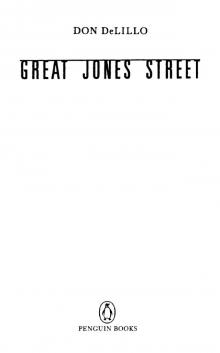 Great Jones Street (Contemporary American Fiction)
Great Jones Street (Contemporary American Fiction)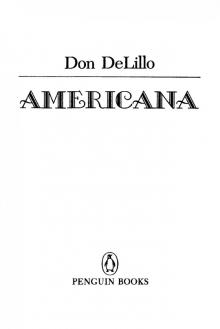 Americana
Americana Running Dog
Running Dog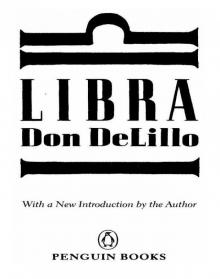 Libra
Libra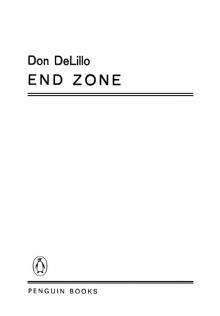 End Zone
End Zone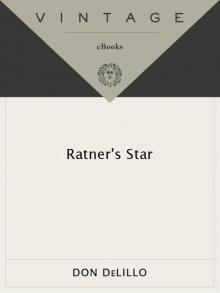 Ratner's Star
Ratner's Star Underworld
Underworld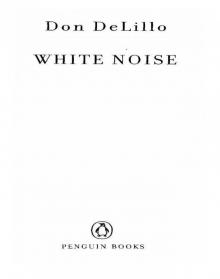 White Noise
White Noise Players
Players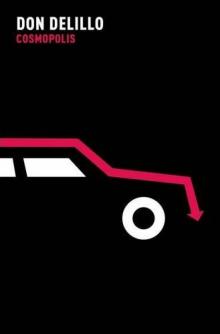 Cosmopolis
Cosmopolis The Silence
The Silence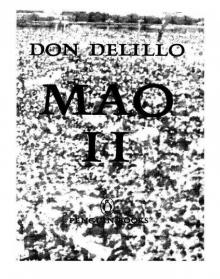 Mao II
Mao II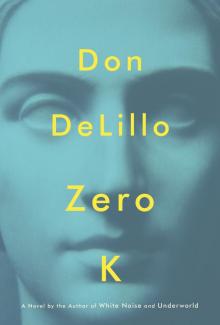 Zero K
Zero K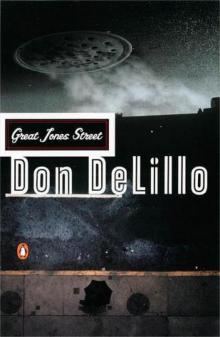 Great Jones Street
Great Jones Street The Angel Esmeralda
The Angel Esmeralda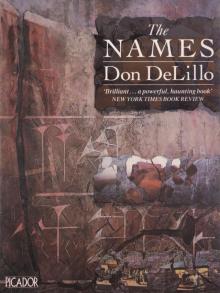 The Names
The Names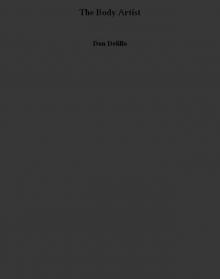 The Body Artist
The Body Artist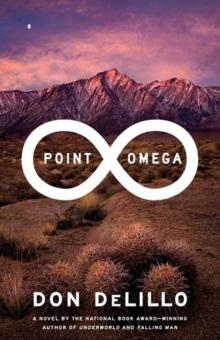 Point Omega
Point Omega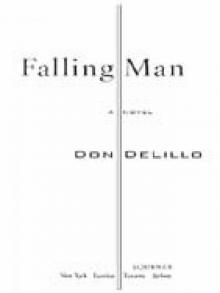 Falling Man
Falling Man